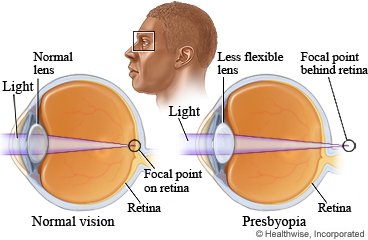
Overview
Presbyopia is a natural part of aging. When you are around age 40, certain changes happen in your eyes. The lenses get thicker. The muscles around the lenses get weaker. And light entering the eye is focused behind the retina instead of on it.
These changes make it harder to read and focus on things that are up close. It may be harder to see in low light or when you are tired. You could also have headaches or eyestrain.
Eyeglasses or contact lenses can help. If you did not wear glasses or contacts before, you may be able to use reading glasses that you buy without a prescription. Ask your eye doctor about those.
If you already wear glasses or contacts, you may need a new prescription. This prescription may change over time if your vision gets worse.
Sometimes surgery is used to treat presbyopia.
Follow-up care is a key part of your treatment and safety. Be sure to make and go to all appointments, and call your doctor if you are having problems. It's also a good idea to know your test results and keep a list of the medicines you take.
How can you care for yourself at home?
Reduce eyestrain
- Wear glasses or contact lenses if your doctor prescribes them.
- Make sure you have good light when you read, work, or study. Use a soft background light plus a more direct light.
- Choose large-print books. And adjust the print size on your computer and online when possible.
- Take frequent breaks when you do things that are hard on your eyes. Blink often. Every 20 minutes, look at something 20 feet away for 20 seconds (the "20-20-20" rule). When your eyes are dry or tired, close and rest them.
- Avoid glare on TV and computer screens. Put your TV or computer where lights don't reflect on the screen. Some people find it easier to work on a computer in a darker room. You can also try special nonglare screens that fit over the computer screen.
Keep your eyes healthy
- Have eye exams as often as your doctor recommends.
- Wear sunglasses. Buy ones that screen out ultraviolet A and B (UVA and UVB) rays.
When should you call for help?
Watch closely for changes in your health, and be sure to contact your doctor if:
- You have vision changes.
Where can you learn more?
Go to http://www.healthwise.net/patientEd
Enter B762 in the search box to learn more about "Presbyopia: Care Instructions".
Current as of: October 1, 2025
Author: Ignite Healthwise, LLC Staff
Clinical Review Board
All Ignite Healthwise, LLC education is reviewed by a team that includes physicians, nurses, advanced practitioners, registered dieticians, and other healthcare professionals.

